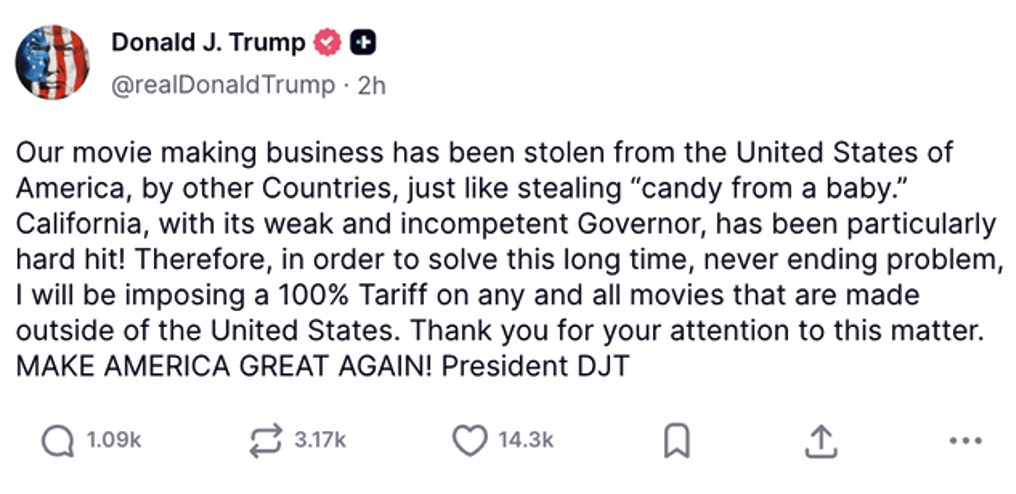Comments
ACCORDING TO LIZ - Those Epstein files must be horribly revealing if Trump is digging so deep into his bucket of loser ideas.
Flailing to rally career generals in an impromptu prayer meeting convened by his “Secretary of War” Fox News analyst and sexual predator Pete Hegseth at Quantico.
Lobbing increasingly irrational accusations at Senate Democrats who are our last best defense against the further shredding of services for most Americans enshrined in the Republican’s funding legislation for 2025-26 which prioritizes tax breaks for the president’s billionaire buddies.
Ramping up spectacular ICE action by further militarizing cities across the country, moving his reality drama attacks from LA to DC to Chicago.
And now, play it again Uncle Sam…

The former reality show host, now masquerading as president, is spinning his wheel of misfortune in promoting a dysfunctional approach to rebooting film and television production within the borders of the United States by again threatening to impose 100% tariffs on all entertainment crafted abroad.
And since tariffs traditionally apply to physical goods, not services, pursuing this would set a dangerous precedent.
Earlier this year, he labeled runaway production a “national security threat” and menaced Hollywood’s movers and shakers not only with onerous economic impact domestically but with the certain retaliation from the international markets from which they derive a significant portion of their profits.
In response to the threat, the industry – studios, unions, and individual actors wrote the president proposing he focus on developing national incentives to counter those of countries competing for production dollars.
Filmmaking initially was primarily an indoor activity where lighting and weather could be controlled before technologies advances allowed filmgoers to travel the world. With the advent of big-screen television, home viewers now expect the same experience.
Ballooning budgets and changed funding mechanisms sent producers scrambling for ways to reduce costs and provide appropriate returns for everyone involved.
Hollywood studios came depend on international incentives to reduce production costs as escalating demand for product with the multiplying ancillary markets starting fifty years ago pushed prices ever higher.
Then streaming fundamentally changed the media landscape again. Smaller returns on investment meant production needed to shift to smart and nimble at a time when the studios were being vacuumed up by multinational conglomerates demanding more money for their bottom lines, and demand had pushed costs for equipment and talent to stratospheric heights
Not only do other countries actually have incentives, but they have universal healthcare and better social services reducing fringe benefits producers have to pay local hires.
While some domestic production hubs have cropped up, those lower labor costs and lucrative tax incentives aimed at developing their own infrastructure primarily lure big dollar projects to other countries. Which will also suffer severe economic injury if Trump makes good on 100% tariffs.
After Trump posted his initial threat in May, he backed off saying “I’m not looking to hurt the industry,” and that he would host a gathering of Hollywood reps, something that has yet to happen.
Bottom line?
The film industry is one of the few sectors where the United States is a net exporter to every major market. Foreign box office brings in about 60% of a blockbuster’s theatrical run. Overall, the industry generates a positive balance of trade with $22.6 billion worth of exports creating a $15.3 billion trade surplus.
So what happens when the rest of world imposes tariffs on U.S.-produced movies and television in their markets?
Despite Trumbelina’s claims to the contrary, the International Emergency Powers Act, which gives the president authority to address threats to national security and the economy specifically excludes media production, protecting the exchange of “information or informational materials” provided it is not otherwise controlled for reasons related to weapons proliferation or international terrorism.”
Will the courts buy into a American project filming in Vancouver as a national security threat?
If Shoot-Himself-in-the-Balls moves forward on this self-fellating ploy, one of the movies affected would be Mel Gibson’s sequel to the Passion of the Christ on the resurrection of Jesus, touted by the actor portraying Jesus Christ as “the biggest film in world history,” now shooting under wraps entirely in Rome’s Cinecittà Studios.
Will Mel Gibson’s Passion sequel shooting in Europe magically garner an exemption?
Opportunities for Americans to work at home and stay with their families would be welcome but it will take time and money to rebuild the infrastructure destroyed by studio executives who, for over a generation, have feathered their bottom lines by basing decisions on what – and where – is cheapest.
When Trump made his previous Hollywood tariff threat, Jimmy Kimmel wisecracked, “Next year, The White Lotus is gonna be set at a Hampton Inn.”
The current threat comes in the wake of the thin-skinned soon-to-be-octogenarian’s attacks on Kimmel and other late-night TV hosts. When Disney returned Kimmel to the airwaves last week, with Nexstar and Sinclair soon following suit, Trump vowed to go after the network again.
The acrimony between him and Gavin Newsom which gained traction from the latter’s rhetoric against the ICE raids and imposition of the National Guard decimating the workforce in key California industries, has flared again with:
“You’re already paying more for eggs, coffee, toys, shoes, electricity, furniture, cars, and flights. Now, Trump wants to raise taxes to see the movies.
“PAY MORE AND ENJOY NOTHING. That’s Donald Trump’s America.”
And “OMG! TRUMP IS NOW PLACING TARIFFS ON JESUS! SICK!”
Perhaps a more astute comment posted on social media: “He is making a revenge statement. Give him an Oscar and maybe he will STFU!”
(Liz Amsden is a former Angeleno now living in Vermont and a regular CityWatch contributor. She writes on issues she’s passionate about, including social justice, government accountability, and community empowerment. Liz brings a sharp, activist voice to her commentary and continues to engage with Los Angeles civic affairs from afar. She can be reached at [email protected].)





